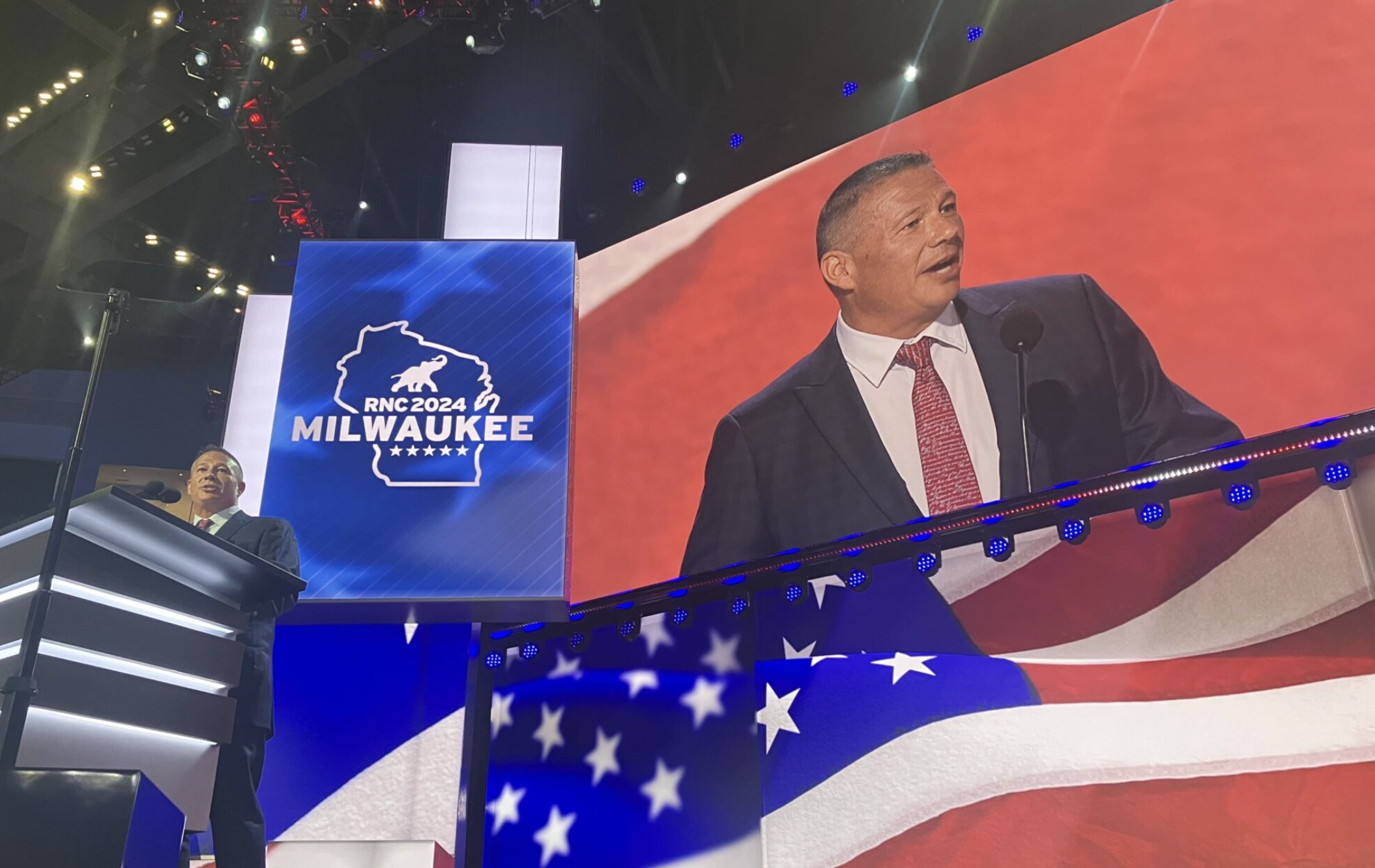
- Details
- By Shawn Griswold
Native Vote 2024. MILWAUKEE, Wisc. — The public safety theme on the second evening at the Republican National Convention included a message from Forest County Potawatomi Chairman James Crawford.
His introductory remarks had a land acknowledgement tone for the host city, despite it not being explicit on the evening speech program.
“It was once home to several Potawatomi villages, including a village close to where we sit today,” Crawford told Republican delegates. “Our ancestors occupied these lands for hundreds of years, fishing area rivers and lakes, hunting the land, tapping maple tree groves for sugar and harvesting crops and fields each fall.”
[Editor's Note: This week Native News Online is in Milwaukee covering the Republican National Convention. In a collaborative effort, Native News Online is working with Native America Calling and Source NM. This article was wrtitten by Shawn Griswold from Source NM.]
There was no direct endorsement for the ticket, but he did extend goodwill in working with a Donald Trump-J.D. Vance administration in one of his last remarks to the delegate floor. “I look forward to working with everyone here to make America safe again,” Crawford said.
The speech lasted just under five minutes. Crawford hit on safety issues related to drugs and violence against women.
“The growing use and abuse of illegal drugs are claiming countless lives on reservations across this country. And Native American women and girls continue to be exploited, trafficked and subjected to violence at reprehensible levels. So tonight’s theme, make America safe again, is especially important for us.”
He did not specifically mention more federal programs to address Missing and Murdered Indigenous People that could use panels in states or under the Interior Department as models. He didn’t mention additional congressional support and funding for the Violence Against Women Act, which helps with prosecutions. And he didn’t get into widespread concerns about police discrimination against Native American victims that families have said they’ve experienced during investigations.
Crawford is the only Native American slated to speak during the 2024 convention.
Republican comments about drugs and “cartels” on tribal lands are lately growing louder. South Dakota Gov. Kristi Noem right now is the most prominent voice with the messaging that reservations are safe havens for drug cartels. This skews public perception on the real issues with illicit drugs, said former South Dakota federal prosecutor Brenden Johnson.
“Suggesting that there’s some sort of pipeline between Mexico and the reservations is silly,” Johnson said in a series on the topic by South Dakota Searchlight. “It would be tantamount to saying, ‘Yeah, the cartels are really focused on Ipswich.’ That’s stupid, and people wouldn’t believe it. Unfortunately, people are more inclined to believe it (about reservations), because they have less knowledge on the reservations.”
In an interview on the floor Tuesday, Montana delegate and former DEA supervisor in the state Stacy Zinn said her job was to, “make positive relationships with the reservations and to do what we could to help do investigations that would negate the cartel presence.”
In her role, she said, she works with multiple federal agencies such as the Bureau of Indian Affairs and FBI to operate investigations on and around tribal lands. She pointed to issues in Montana with jurisdiction between local, county and state police. These problems stall or delay investigations, she said.
She had a suggestion for a fix, and it’s something that some tribes across the country are already doing with states. They create a legal memorandum of understanding to allow cross-jurisdictional police investigations.
“If a tribe is going to be robust, and really is serious about taking care of their crime on their their lands, then I would I suggest, based on my experience, and what I’ve seen, you want a (memorandum of understanding) with the local law enforcement in order to build that strength in numbers,” Zinn said.
That does require a bit of a working relationship between tribes and the states. In places like New Mexico, a friendly governor can make that happen through policy. But in places like South Dakota, where the governor is banned from all nine reservations thanks to her comments, poor government-to-government relationships can stunt any progress.
“If we can just lower that animosity at times,” Zinn said, “then the main goal is to keep the community safe.”
She also acknowledged that all police agencies need to get on the same page.
“If this is how we’re going to do things, then it’s a force multiplier,” she said. “The relationships between law enforcement all across the board should be a positive experience.”
Help us defend tribal sovereignty.
At Native News Online, our mission is rooted in telling the stories that strengthen sovereignty and uplift Indigenous voices — not just at year’s end, but every single day.
Because of your generosity last year, we were able to keep our reporters on the ground in tribal communities, at national gatherings and in the halls of Congress — covering the issues that matter most to Indian Country: sovereignty, culture, education, health and economic opportunity.
That support sustained us through a tough year in 2025. Now, as we look to the year ahead, we need your help right now to ensure warrior journalism remains strong — reporting that defends tribal sovereignty, amplifies Native truth, and holds power accountable.
 The stakes couldn't be higher. Your support keeps Native voices heard, Native stories told and Native sovereignty defended.
The stakes couldn't be higher. Your support keeps Native voices heard, Native stories told and Native sovereignty defended.
Stand with Warrior Journalism today.
Levi Rickert (Potawatomi), Editor & Publisher

